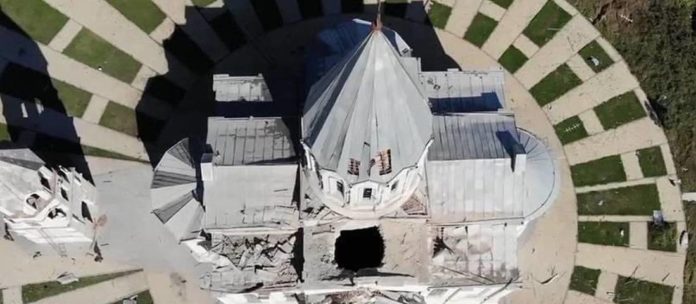The narrative relating to the 2020 Azerbaijani invasion of Nagorno-Karabakh has been deeply shocking and disappointing not only to Armenians, but also to many non-Armenian scholars specialized in the South Caucasus. On October 8, 2020, the Los Angeles Times released information accompanied with the headline “Armenia Accuses Azerbaijan of Shelling Historic Cathedral in Nagorno-Karabakh.” Even though the article was complemented with the photo of a heavily damaged church, it also included a statement of Azerbaijan’s Defense Ministry which denied targeting historical, cultural and, especially, religious buildings. One might wonder: if the cathedral is obviously destroyed and Azerbaijan denies this, there is only one possible conclusion – the damage was obviously self-inflicted. What does it mean that Armenia “says” or “accuses”? Such caution creates the impression of “suspended” reality. Two sides say something; however, it seems extremely hard to determine which one is telling the truth. Uninformed readers must have found it extremely difficult to makes sense of this; informed readers might have considered this as an offense to one’s intelligence.
The abovementioned article shows only one of the disturbing tendencies present in the coverage of the invasion. The war crimes conducted by Azerbaijan – targeting the civilian population, the use of cluster bombs, destroying the cultural heritage of Armenians, and the recent humanitarian crisis due to the cutting off gas supplies to Artsakh – are taking too long to be properly recognized and still are framed as mutual accusations between engaged parties and not as direct and tangible acts of hostility. Meanwhile, the lives which have been lost along with the cultural, psychological, and economic damage are not an issue of politically neutral headlines, but a reality. Giving it a “suspended” status is simply cynical.
Similar trends are observable on a political level. Only recently, for the “urgent de-escalation” called for by the European Union on November 17, 2021, the Hague asked both Armenia and Azerbaijan to “refrain from provocative actions” on December 21, 2021. The Organization for Security and Cooperation in Europe (OSCE) Minsk Group called on both Armenia and Azerbaijan to “refrain from the use of force and engage in dialogue” on January 12, 2022. This year, on March 25, the US Department of State released a statement on its DoS Europe and Eurasia Twitter account. It stated “The US is deeply concerned about gas disruptions and Azerbaijan’s troop movements. Armenia and Azerbaijan need to use direct communication channels to immediately deescalate.” Similarly, on the same day, UN Secretary Antonio Guterres called on Azerbaijan and Armenia to “exercise restraint.”
These statements were and are mirrored by press releases and are examples of what can be best described by the term “toxic neutrality,” aptly coming from an obvious confusion between equivocation and objectivity. The equivocation that we can see currently assumes a full symmetry of actors involved and ignores the deeper context of power dynamic and power imbalance, obviously failing to differentiate between defense and aggression. Though this might have been interpreted simply as cautious diplomatic language, following the Russian invasion on Ukraine, the diplomatic language on this issue is certainly much more straightforward and the only person who still calls for “both sides to deescalate,” Pope Francis, is heavily criticized. In fact, he is the only person for whom it somehow makes sense to frame it this way.
In 2020 when I tried to explain the obvious gross imbalance of power both in economic and military resources as well as in influence as evidence that Armenia was fighting a war it did not choose to fight, I faced criticism for being overly pro-Armenian. At the same time, I still believe that objectivism obliges us to use the analytical tools we have in order to understand both the historical and modern context of the conflict and to state facts. In the era of post-truth, it is the duty towards reality and truth as they are, not as we wish them to be and not as the idea of equivocation frames them.
Adequate coverage came mainly from independent journalists such as Lindsey Snell. Journalists of leading English-language press agencies consistently keep referring to Artsakh as an “occupied territory” or “disputed territory” at best. Even though these labels are technically accurate, they are also misleading. The invasion was commonly referred to as an attempt of Azerbaijan to restore its territorial integrity. At the same time, the last 30 years after the first Nagorno-Karabakh War was largely ignored. During this time, an entire generation has been raised in Azerbaijan knowing little other than the utmost hate towards Armenians. The discriminatory and violent statements of both Azerbaijani President Ilham Aliyev and Turkish President Recep Tayyip Erdogan have not been mentioned in most of the press news.









